Unit 3Lesson 16 How Safe Is Your Home? 课件(共15张PPT)
文档属性
| 名称 | Unit 3Lesson 16 How Safe Is Your Home? 课件(共15张PPT) |

|
|
| 格式 | zip | ||
| 文件大小 | 384.7KB | ||
| 资源类型 | 教案 | ||
| 版本资源 | 冀教版 | ||
| 科目 | 英语 | ||
| 更新时间 | 2022-03-28 00:00:00 | ||
图片预览

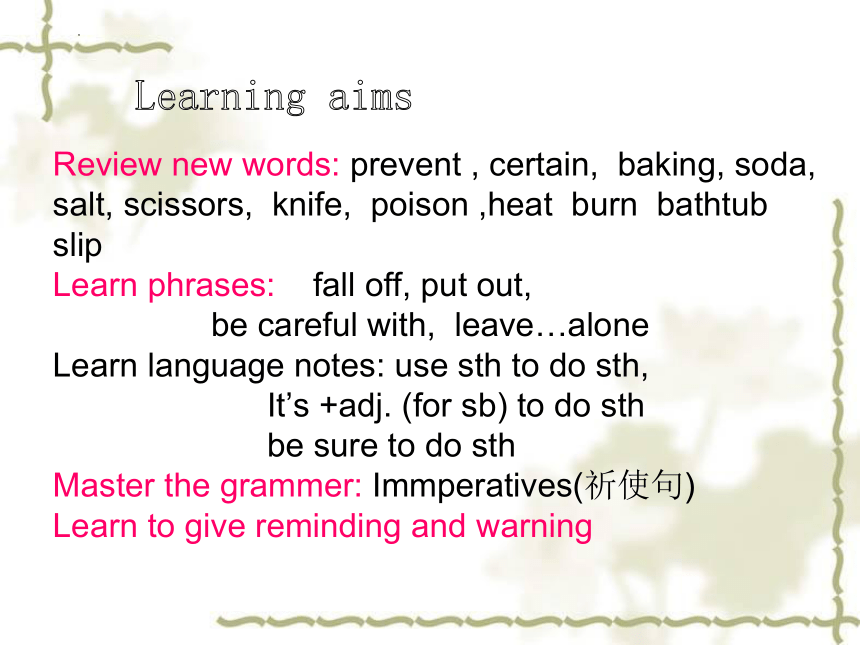
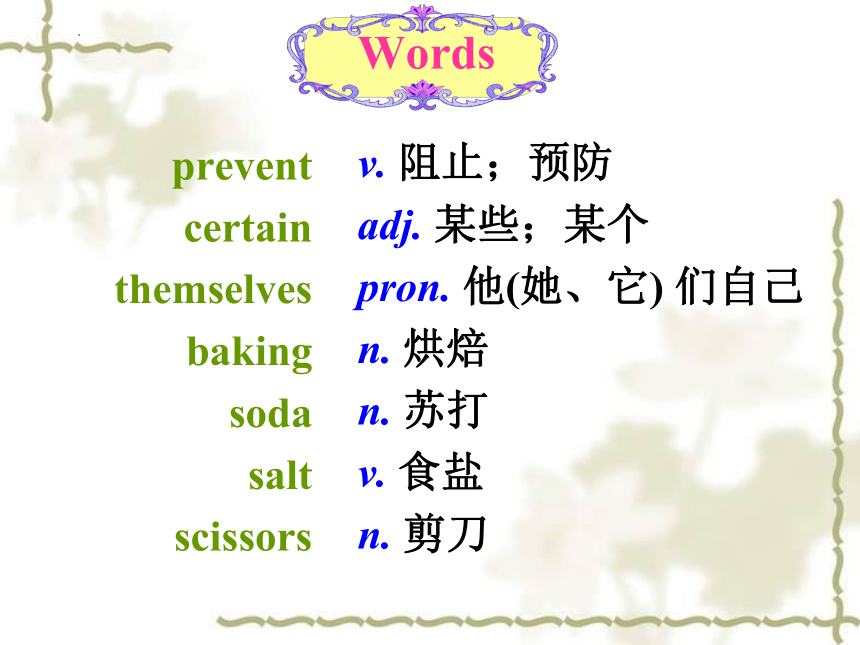
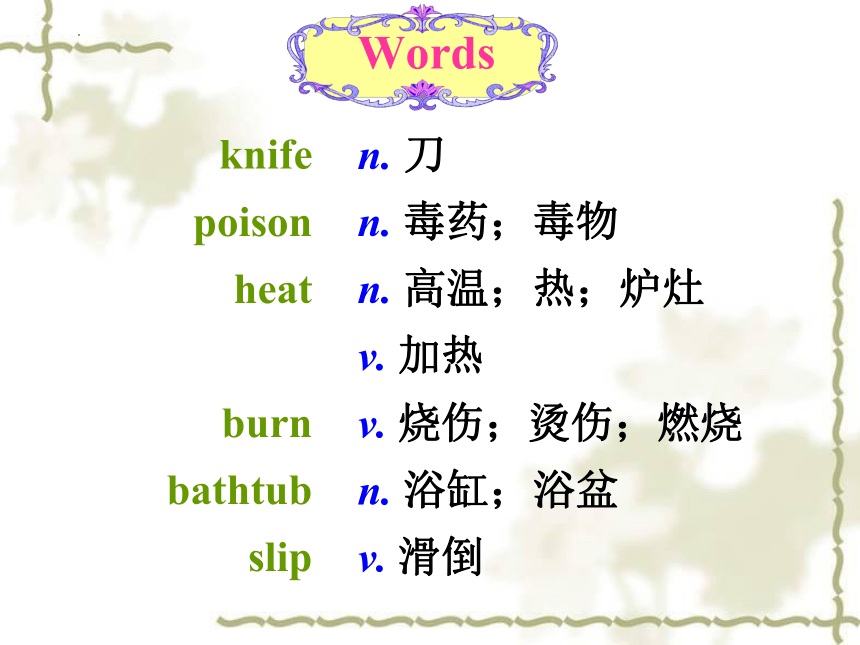
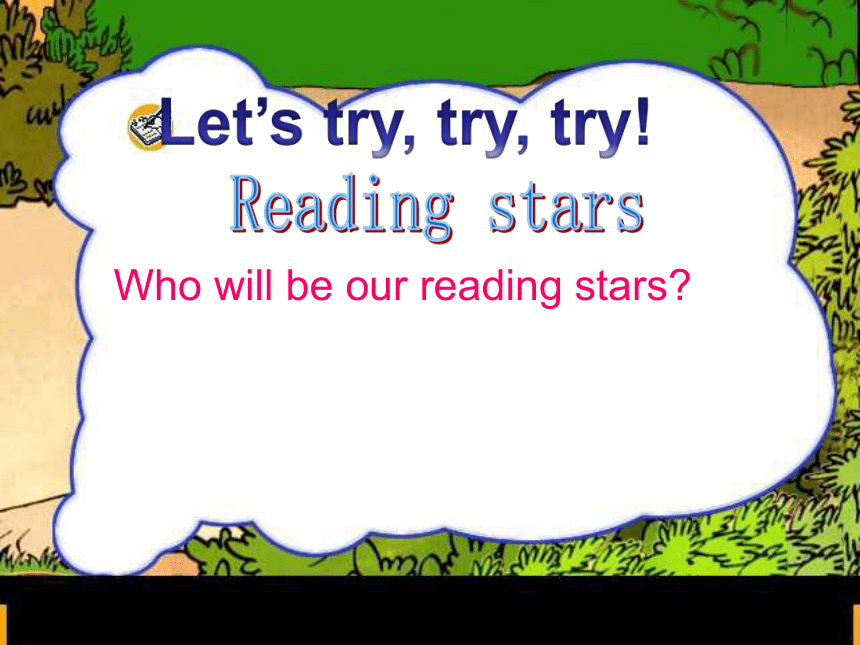
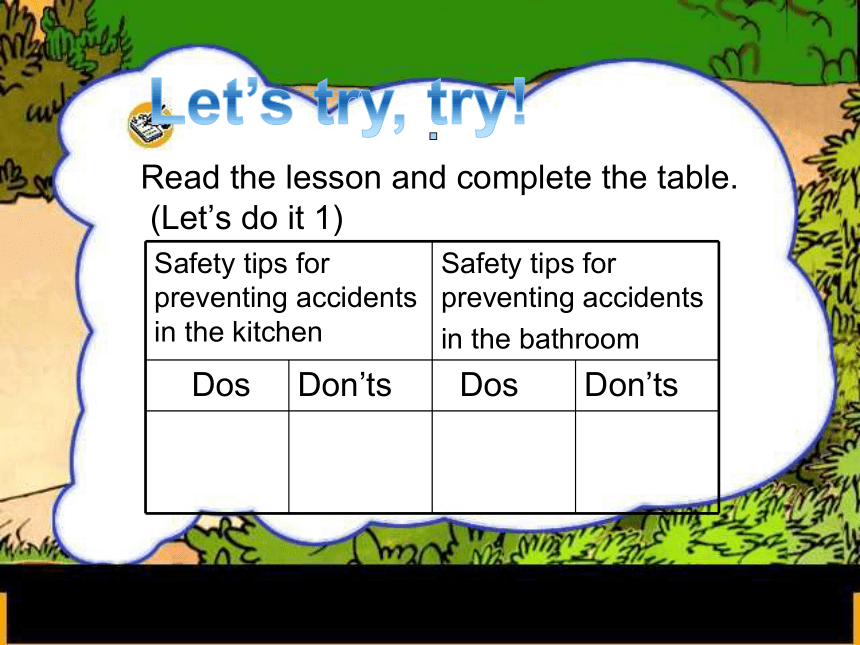
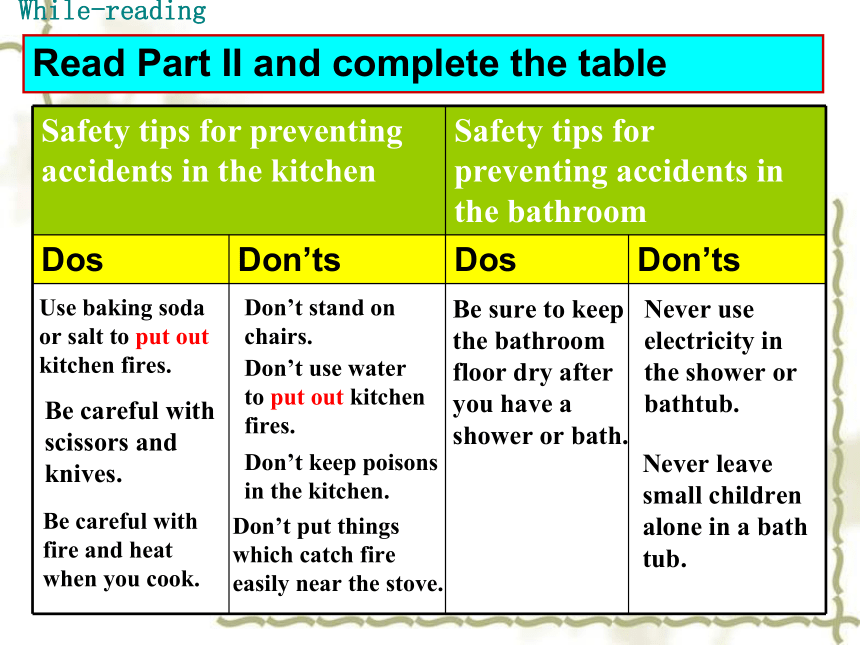
文档简介
(共15张PPT)
3
Unit
Lesson 16
How Safe Is Your Home
Review new words: prevent , certain, baking, soda, salt, scissors, knife, poison ,heat burn bathtub slip
Learn phrases: fall off, put out,
be careful with, leave…alone
Learn language notes: use sth to do sth,
It’s +adj. (for sb) to do sth
be sure to do sth
Master the grammer: Immperatives(祈使句)
Learn to give reminding and warning
Learning aims
Words
prevent
certain
themselves
baking
soda
salt
scissors
v. 阻止;预防
adj. 某些;某个
pron. 他(她、它) 们自己
n. 烘焙
n. 苏打
v. 食盐
n. 剪刀
Words
knife
poison
heat
burn
bathtub
slip
n. 刀
n. 毒药;毒物
n. 高温;热;炉灶
v. 加热
v. 烧伤;烫伤;燃烧
n. 浴缸;浴盆
v. 滑倒
Reading stars
Who will be our reading stars
Let’s try, try, try!
Read the lesson and complete the table.
(Let’s do it 1)
Safety tips for preventing accidents in the kitchen Safety tips for preventing accidents in the bathroom
Dos Don’ts Dos Don’ts
Let’s try, try!
Read Part II and complete the table
Safety tips for preventing accidents in the kitchen Safety tips for preventing accidents in the bathroom
Dos Don’ts Dos Don’ts
Use baking soda or salt to put out kitchen fires.
Be careful with scissors and knives.
Be careful with fire and heat when you cook.
Don’t stand on chairs.
Don’t use water to put out kitchen fires.
Don’t keep poisons in the kitchen.
Be sure to keep the bathroom floor dry after you have a shower or bath.
Never use electricity in the shower or bathtub.
Never leave small children alone in a bath tub.
Don’t put things which catch fire easily near the stove.
While-reading
Read Part I and tell true (T) or false (F)
Sometimes home is not safe enough. ( )
Kitchen and living room are the two most dangerous rooms in the house. ( )
People can prevent certain accidents. ( )
T
F
T
Deal with the language notes
(1) Can people prevent certain accident.
(2)Many people hurt themselves by falling off chair.
(3)Don’t use water to put out fire.
(4)Use baking soda instead.
(5)Be careful with scissors.
(6)Don’t use poison in the kitchen.
(7)Never leave small children alone in a bathtub.
(8 ) It’s easy to slip and fall on a wet floor.
(9 ) Be sure to keep the bathroom floor dry after you have a shower or bath.
Read the passage again and pay attention to the imperatives(祈使句).
(Please) + Do sth. !
Be + adj. !
(Please) + Don’t do sth. !
Never do sth. !
affirmative
negative
structure
1. Jim, _____ me a hand.
A. gives B. is giving C. give D. will give
2. _____ get off the lorry until it stops.
A. Do B. Can’t C. / D. Don’t
3. Don’t forget to put the book back on the shelf,______
A do you B don’t you C will you D won’t you
4. — ____ higher, and you will see the house.
— OK.
A. If you stand B. To stand C. When you stand D. Stand
5. _____ come in, please.
A. Do B. Will C. Won't D. Did
Exercise
C
D
C
D
A
Post-reading
用所给词的适当形式填空。
1.Li Ming hurt himself by _______ (fall)
off the bike.
2.Be ________(care) with the dog.
3—Who taught Linda and Kate Chinese
—Nobody. They learn it all by __________(they).
4. Take these_______ (knife) away . Don’t hurt the baby.
5.Nobody can prevent us from ________(work) hard.
6. It’s difficult ______(learn) English well.
7.Be sure_______ (finish) your homework.
8. We use fire_______ (cook).
falling
careful
themselves
knives
working
to learn
to finish
to cook
Practice
Fill in the blanks with the correct forms of the words from the lesson. The first letter is given.
1. Tom won’t drive to Beijing. He’ll take a bus i________.
2. We should eat less s________ to prevent heart disease.
3. Take the k________ away. The little boy may cut himself.
4. A hot coal fell out the fire and b__________ the shoes.
5. Grandma likes to sit in the sun. She enjoys the h________ of the sun.
nstead
alt
nife
urned/urnt
eat
Finish exercises of Lesson 16 in the exercise book.
Preview next lesson.
Better your poster.
Tell your parents and your friends the safety tips you learnt in class.
Thank you!
be careful with表示“小心;谨慎”,也表示“吝啬”;
be careful of/ about表示“关切;注意”。
3
Unit
Lesson 16
How Safe Is Your Home
Review new words: prevent , certain, baking, soda, salt, scissors, knife, poison ,heat burn bathtub slip
Learn phrases: fall off, put out,
be careful with, leave…alone
Learn language notes: use sth to do sth,
It’s +adj. (for sb) to do sth
be sure to do sth
Master the grammer: Immperatives(祈使句)
Learn to give reminding and warning
Learning aims
Words
prevent
certain
themselves
baking
soda
salt
scissors
v. 阻止;预防
adj. 某些;某个
pron. 他(她、它) 们自己
n. 烘焙
n. 苏打
v. 食盐
n. 剪刀
Words
knife
poison
heat
burn
bathtub
slip
n. 刀
n. 毒药;毒物
n. 高温;热;炉灶
v. 加热
v. 烧伤;烫伤;燃烧
n. 浴缸;浴盆
v. 滑倒
Reading stars
Who will be our reading stars
Let’s try, try, try!
Read the lesson and complete the table.
(Let’s do it 1)
Safety tips for preventing accidents in the kitchen Safety tips for preventing accidents in the bathroom
Dos Don’ts Dos Don’ts
Let’s try, try!
Read Part II and complete the table
Safety tips for preventing accidents in the kitchen Safety tips for preventing accidents in the bathroom
Dos Don’ts Dos Don’ts
Use baking soda or salt to put out kitchen fires.
Be careful with scissors and knives.
Be careful with fire and heat when you cook.
Don’t stand on chairs.
Don’t use water to put out kitchen fires.
Don’t keep poisons in the kitchen.
Be sure to keep the bathroom floor dry after you have a shower or bath.
Never use electricity in the shower or bathtub.
Never leave small children alone in a bath tub.
Don’t put things which catch fire easily near the stove.
While-reading
Read Part I and tell true (T) or false (F)
Sometimes home is not safe enough. ( )
Kitchen and living room are the two most dangerous rooms in the house. ( )
People can prevent certain accidents. ( )
T
F
T
Deal with the language notes
(1) Can people prevent certain accident.
(2)Many people hurt themselves by falling off chair.
(3)Don’t use water to put out fire.
(4)Use baking soda instead.
(5)Be careful with scissors.
(6)Don’t use poison in the kitchen.
(7)Never leave small children alone in a bathtub.
(8 ) It’s easy to slip and fall on a wet floor.
(9 ) Be sure to keep the bathroom floor dry after you have a shower or bath.
Read the passage again and pay attention to the imperatives(祈使句).
(Please) + Do sth. !
Be + adj. !
(Please) + Don’t do sth. !
Never do sth. !
affirmative
negative
structure
1. Jim, _____ me a hand.
A. gives B. is giving C. give D. will give
2. _____ get off the lorry until it stops.
A. Do B. Can’t C. / D. Don’t
3. Don’t forget to put the book back on the shelf,______
A do you B don’t you C will you D won’t you
4. — ____ higher, and you will see the house.
— OK.
A. If you stand B. To stand C. When you stand D. Stand
5. _____ come in, please.
A. Do B. Will C. Won't D. Did
Exercise
C
D
C
D
A
Post-reading
用所给词的适当形式填空。
1.Li Ming hurt himself by _______ (fall)
off the bike.
2.Be ________(care) with the dog.
3—Who taught Linda and Kate Chinese
—Nobody. They learn it all by __________(they).
4. Take these_______ (knife) away . Don’t hurt the baby.
5.Nobody can prevent us from ________(work) hard.
6. It’s difficult ______(learn) English well.
7.Be sure_______ (finish) your homework.
8. We use fire_______ (cook).
falling
careful
themselves
knives
working
to learn
to finish
to cook
Practice
Fill in the blanks with the correct forms of the words from the lesson. The first letter is given.
1. Tom won’t drive to Beijing. He’ll take a bus i________.
2. We should eat less s________ to prevent heart disease.
3. Take the k________ away. The little boy may cut himself.
4. A hot coal fell out the fire and b__________ the shoes.
5. Grandma likes to sit in the sun. She enjoys the h________ of the sun.
nstead
alt
nife
urned/urnt
eat
Finish exercises of Lesson 16 in the exercise book.
Preview next lesson.
Better your poster.
Tell your parents and your friends the safety tips you learnt in class.
Thank you!
be careful with表示“小心;谨慎”,也表示“吝啬”;
be careful of/ about表示“关切;注意”。
同课章节目录
- Unit 1 Stay Healthy
- Lesson 1 What's Wrong,Danny?
- Lesson 2 A Visit to the Dentist
- Lesson 3 Good Food, Good Health
- Lesson 4 Don't Smoke, Please!
- Lesson 5 Jane's Lucky Life
- Lesson 6 Stay Away from the Hospital
- Unit Review
- Unit 2 Great People
- Lesson 7 What Is the Meaning of Lift?
- Lesson 8 A Universe of Thought
- Lesson 9 China's Most Famous "Farmer"
- Lesson 10 Touch the World
- Lesson 11 To China, with Love
- Lesson 12 Guess My Hero!
- Unit Review
- Unit 3 Safety
- Lesson 13 Be Careful,Danny!
- Lesson 14 Accidents Happen
- Lesson 15 My Helmet Saved My Life!
- Lesson 16 How Safe Is Your Home?
- Lesson 17 Staying Safe in an Earthquake
- Lesson 18 Never Catch a Dinosaur
- Unit Review
- Unit 4 Stories and poems
- Lesson 19 A Story or a Poem?
- Lesson 20 Say It in Five
- Lesson 21 The Fable of the Woodcutte
- Lesson 22 The Giant(Ⅰ)
- Lesson 23 The Giant(Ⅱ)
- Lesson 24 Writing a Poem
- Unit Review
- Unit 5 Look into Science
- Lesson 25 Let's Do an Experiment!
- Lesson 26 Keep the Candle Burning
- Lesson 27 Planet Danny
- Lesson 28 The Study of Living Things
- Lesson 29 DNA—The Story of You
- Lesson 30 Science Affects Us
- Unit Review
- Unit 6 Movies and Theate
- Lesson 31 A movie or a Play
- Lesson 32 Moving Pictures
- Lesson 33 The Fisherman and the Goldfish(Ⅰ)
- Lesson 34 The Fisherman and the Goldfish(Ⅱ)
- Lesson 35 Theatres Are Fun!
- Lesson 36 Making Plays Is Fun
- Unit Review
